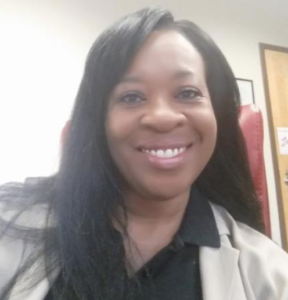
Jullet Davis Weaver, PhD, MHA. Associate Professor and Interim Director of the Division of Health Care Management at Florida Agricultural and Mechanical University (FAMU)
Interview by Kimberly Lawson, MPH
Dr. Weaver holds a Master’s in Health Administration and doctorate in Health Policy and Administration from the Pennsylvania State University. Her research focuses primarily on organizational issues associated with post-acute care facilities and institutionalized populations and health care disparities. In addition to numerous small grants, Dr. Weaver received funding via a contract from the National Institute on Aging to analyze trends in nursing home segregation. She has published in various journals, including The Gerontologist, Advances in Health Care Management, Social Science and Medicine, and The Journal of Applied Gerontology. Dr. Davis Weaver is a recent recipient of a Pilot Project award from Florida A&M University School of Graduate Studies and Research and the Office of Sponsored Programs for her project, “Pilot Testing a Zika-Specific, Multi-Dimensional Survey Instrument.”
Which of the NRMN program(s) have you participate in (if more than one)?
2017 SETH Grantwriting Coaching Group
What attracted you to NRMN SETH Grant Writing Coaching Group?
Dr. Richard Yanagihara (RCMI Principal Investigator at the University of Hawaii at Manoa) reviewed my initial grant proposal and suggested the writing group.
Describe your role in the SETH program, and tell us a little about your experience in that role.
I was a participant (trainee) and it was very informative. I enjoyed the opportunity to interact with individuals from various disciplines. Although I am at a later stage in my career, tenured associate going up for full professor, it was still helpful to chat with individuals who are in the early stages of their careers. Additionally, I learned useful information that I have since passed on to colleagues in the School of Allied Health Sciences at Florida A&M University.
How did this specific coaching group model [SETH] provide structure or support throughout the writing process?
Scheduling meetings every other week meant that I needed to work on the proposal. I did not have the “luxury” to put it on the back burner for weeks at a time. Also, working on it in a section at a time helped me to focus and improve upon one construct at a time. Finally, reading and providing feedback to others in the group helped me as I edited my own project.
How did the Health Disparities Learning Collaboratory support your coaching group engagement and accountability?
It was very beneficial to have all communication in a single location. I could easily find documents, comments, and other information. I am inundated with hundreds of emails per week and I was happy I did not have to sift through all of that to find information from my coaching group. Also, I appreciated the posts of those in the general group.
What impact will your grant have on your institution/department?
We will use the funds to complete a pilot project. The findings of the pilot project will then be used in a larger NIH grant proposal. Being able to confirm to my Dean, Dr. Cynthia Hughes-Harris, that her support of my NRMN attendance resulted in an internal award less than six months later was very rewarding. Finally, this grant is a collaborative effort between myself and two other colleagues, Dr. Marisa Lewis and Professor Pia Woodley. Both colleagues are convinced of the value of NRMN in helping faculty to write successful grants.
If someone called you and asked, “Why should I become involved with NRMN?” how would you respond?
NRMN has a well-developed structure to enhance the odds of grant success. The mentors and other faculty associated with the network are committed to your success. The mentors will invest time in assisting you with your proposal. You will never feel like you are wasting their time.
Have you participated in other similar programs in the past? If so, how was your experience with NRMN different or unique?
Yes. I believe all of my experiences have been worthwhile. But, the mentor I was assigned to via NRMN, Dr. Jill Hamilton, was a better fit with my research interests than those from previous programs.
How has your experience with NRMN changed the way you approach your career in the sciences?
I definitely appreciate the importance of a mentor when writing a grant proposal. In fact, I am now seeking another mentor for a new proposal.